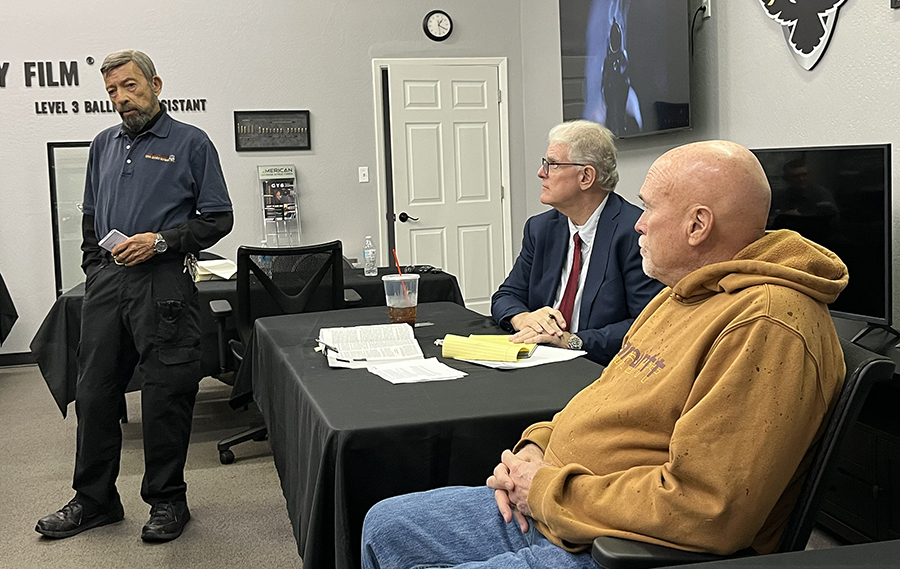The Police Are Not Your Enemy!
by Marty Hayes, J.D.
It is very popular in the self-defense after action assistance industry (read self-defense insurance) for attorney pundits on YouTube to scream “never talk to the police” from the rafters. They tell horror stories about how their clients talk themselves into prison, when the police use their statements against them in court.
In our Network member education programs, we have discussed how we think armed citizens should act towards police if they have to use force, and I see more and more well reasoned, logical people using Massad Ayoob’s Five Point Checklist to teach or advise armed citizens how to handle the interaction with police.
This topic comes to mind because recently two Network members shot in self defense, and they DID NOT invoke their fifth amendment right to remain silent. Less than a month later, they are walking around free with no criminal charges pending. In both these cases, shortly after the incident police questioned our members. Based on our members’ statements, they investigated the shootings and based on the investigation, concluded no evidence existed to arrest our members. In either case, if the member had not explained to the police what occurred to make them have to shoot, they likely would have been arrested.
My background consisted of about a decade of law enforcement work, primarily as a patrol officer who, because of working in small towns, also served as the investigator of alleged crimes. As a result, I have a rather unique perspective in contemplating this issue.
I would be willing to state that the vast majority of police are not hostile to armed citizens using force in self defense, and if they don’t actually identify with the armed citizen, at least do not have a bias against them. It is only in urban, anti-gun jurisdictions (mostly) where the police target armed citizens and will seek out evidence to arrest, while ignoring exculpatory evidence.
How does working in populated, urban societies result in this type of “bent” police force? The answer lies in the hiring process. Before an individual is hired, they have to sit for an oral interview. At this interview, the police administrators who conduct the oral interviews can probe the candidate’s feelings toward the gun issue. In addition, the psychologists who either pass or fail the candidate can at times probe into the psyche of the candidate to see if he or she would be a “good fit” in the department. A “good fit” might mean the type of cop who will “go along to get along.” By the time this weeding-out procedure is completed, those in power can be assured that they are hiring officers who do not possess solid, patriotic personalities and who are moldable. The same can be said about federal law enforcement. Consequently, if one needs to decide just how much to cooperate with police after an incident, the reputation of the agency and how anti-gun the administration is matters.
I do have some bright lines that if crossed, I have decided I will not make any statements. One line is if I am handcuffed and read my Miranda warnings. At that point, I will politely ask, “Why am I handcuffed? Why are you reading me my rights? Am I under arrest?” If this is the case, I will simply tell the police I am willing to cooperate once I have spoken to a lawyer.
To further explain these nuances, a few months ago, I made a couple of YouTube videos which explained in detail the issues surrounding with talking to the police. If you haven’t seen these videos, I would recommending you watch Making Statements Part 1 https://www.youtube.com/watch?v=vW2nh0AJw2E and Making Statements Part 2 https://www.youtube.com/watch?v=LAq16Dpf__U
As always, what you do is ultimately your choice, and the consequences of your choice or choices are your responsibility. Choose wisely.
One More Deadly Force Instructor Course This Year
Last month, I was honored to assist Massad Ayoob in certifying 20 armed citizens as deadly force instructors. Most of them were instructors who spend most of their time teaching concealed carry licensing courses in their respective states. We also had a few Network members who simply wanted to improve their knowledge in this critical area. We are teaching another offering of this class in Washington State on July 22-26, 2024. Browse to https://firearmsacademy.com/guest-instructors/deadly-force-instructor-washington for details.
 The high point of the deadly force instructor course for most students is the moot court/mock trial which we involve the whole class in the court procedure. We use the students as jurors, as witnesses in court, as experts in court, and one lucky student gets to be tried for murder. When we teach this course, typically once or twice a year, we try to get a real local judge to run the court proceedings, and if we have any attorneys in class, especially criminal defense attorneys or prosecutors, we ask them to play the parts of prosecutors or defense attorneys.
The high point of the deadly force instructor course for most students is the moot court/mock trial which we involve the whole class in the court procedure. We use the students as jurors, as witnesses in court, as experts in court, and one lucky student gets to be tried for murder. When we teach this course, typically once or twice a year, we try to get a real local judge to run the court proceedings, and if we have any attorneys in class, especially criminal defense attorneys or prosecutors, we ask them to play the parts of prosecutors or defense attorneys.
Photo: John McGrath, an instructor with the Arizona Church Security Network played the role of the defendant in a recent Deadly Force Instructor class, with Ayoob questioning him and Tim Forshey, an Arizona Network Affiliated attorney and judge for the day, listening intently. This mock trial concluded with a mistrial, with the jury deadlocked.
If you are not an active instructor, should you take this course? The answer to that question is, unequivocally, YES! When you testify at your self-defense trial, wouldn’t it be worthwhile to be able to explain to the jury that you are the very rare armed citizen who was so concerned about doing everything right if pressed into the need to use deadly force, that you spend your own time and money to attend and become certified as a deadly force instructor? I very much think so.
I am reminded of the prosecution of Kayla Giles for murder, where she was found guilty of second degree murder after shooting her ex-husband. In viewing an interview with her from prison on YouTube by attorney Marc Victor, it was plain to me that her legal defense was abhorrent, bordering on negligent. For those of you who have not followed her case, she is the USCCA member who was dropped by the USCCA in the middle of her representation. Here is a link to the video interview, which is well worth watching. Kayla Giles Shares Her Side of the Story with Attorneys On Retainer https://www.youtube.com/watch?v=JRAr5Hq2TYY . In a future column, I hope to give a complete breakdown as to why I believe her defense was “abhorrent.”

